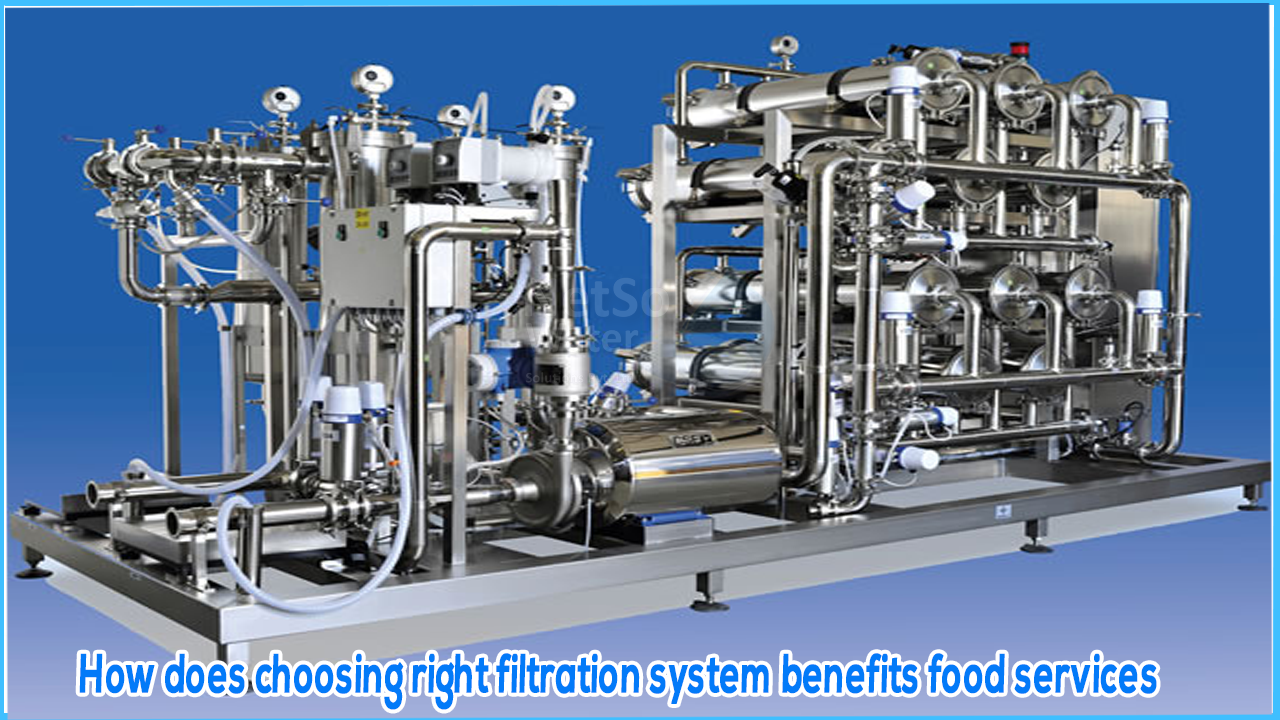Water filtration in foods Industry
We have the list of beverages that use the filtration technology. Following are some of the more prevalent beverages such as Wine, soda, juice, water, and milk.
Some of the more common food industries that use filtration technology are
- Dairy goods such as cheese
- Meat and fish, as well as their solid by-products (not including oils, fat, and juices) Vegetables and fruits (not including oils, fat, and juices) Fats and oils
- Grains, cereals, and starches are all examples of carbohydrates.
A variety of dry and liquid separation processes are used in food and beverage production. Below are a few common applications:
- Salt production
- Cream separation (from milk)
- Water purification – Membranes are used to purify water before used as a food or beverage ingredient.
- Wastewater treatment – Wastewater is treated at facilities.
- Corn wet milling - Corn wet milling necessitates a number of filtration processes, including micro and nanofiltration. Filtration is used to eliminate microbes and to concentrate and clarify corn syrup.
- Sugar juice and crystals - Before a centrifuge is used to extract sugar crystals, rotary vacuum drum filters separate sugar juice from settled muds.
- Vegetable seed oil refinement — To refine and de-wax vegetable seed oils, tubular or disc centrifuges and vacuum filters are typically utilized.
Separation activities such as grain separation and dewatering, as well as clarifying liquids, are all part of the beer and spirits production process. Filter presses, decanter centrifuges, and sheet filters are all employed in the process.
WHAT ARE THE BENEFITS OF FILTRATION IN THE FOOD SERVICE INDUSTRY?
Compared to traditional food and beverage production, filtration has a number of advantages. Cold stabilization, for example, is a viable and cost-effective alternative to flash pasteurization in beer production. Winemakers can use filtration technology to optimize the winemaking process, resulting in higher-quality wines in less time.Clarification filtration can also save money on labour because it eliminates the need for kieselguhr filters, which must be cleaned frequently. Filtration and separation technology can help with the following:
1. Filter out undesirable substances from food and drinks. Make a distinction between attractive materials, food and beverage products, and waste streams. Ingredients that are concentrated, such as tea or protein make food and beverage items clearer. Ensure that food and beverage items are free of contaminants. Aromas can be recovered. Furthermore, filtering and separation technology aids the food and beverage industry in meeting worldwide sustainability requirements as well as its own internal sustainability goals.
How does choosing right filtration system benefits food services?
Filtration technology was created for a specific purpose. While some types of filtration and separation systems have a wide range of uses, it's critical to choose one that can fulfil your specific requirements.
- 1. SynderFiltration offers a comprehensive pilot study programme, as well as engineering support, to assist in the development of innovative applications that will result in operating and/or capital cost reductions in the long run.
- 2. The most significant criteria to consider, in addition to selecting a filtration system tailored for the filtration, concentration, or separation operation at hand, are
-Hygienic standards: Is the technology capable of maintaining a high level of cleanliness in a continuous operation setting? Is it up to snuff in terms of hygiene standards
-System Reliability: How trustworthy is the system? How long do you think it'll last? What procedures will be in place for breakdowns, service, and maintenance? Is the technology efficient in its operation? Does it make your food and beverage production processes more efficient? Is there a considerable improvement in the quality of your end product as a result of the technology? Is it possible to make additional products, such as concentrations or extracts, as an added bonus?
This will almost always necessitate a custom or semi-custom solution. Pilot experiments for food and beverage applications are critical. As a result, proper membrane and system configuration and operating parameters can be ensured.



